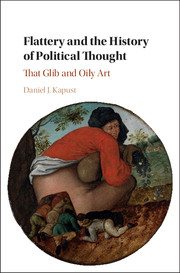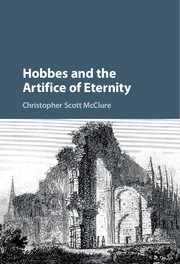Flattery and the History of Political Thought
That Glib and Oily Art
$108.00 (C)
- Author: Daniel J. Kapust, University of Wisconsin, Madison
- Date Published: January 2018
- availability: Temporarily unavailable - available from TBC
- format: Hardback
- isbn: 9781107043367
$
108.00
(C)
Hardback
Other available formats:
eBook
Looking for an examination copy?
If you are interested in the title for your course we can consider offering an examination copy. To register your interest please contact collegesales@cambridge.org providing details of the course you are teaching.
-
Flattery is an often overlooked political phenomenon, even though it has interested thinkers from classical Athens to eighteenth-century America. Drawing a distinction between moralistic and strategic flattery, this book offers new interpretations of a range of texts from the history of political thought. Discussing Cicero, Pliny, Castiglione, Machiavelli, Hobbes, Mandeville, Smith, and the Federalist/Anti-Federalist debates, the book engages and enriches contemporary political theory debates about rhetoric, republicanism, and democratic theory, among other topics. Flattery and the History of Political Thought shows both the historical importance and continued relevance of flattery for political theory. Additionally, the study is interdisciplinary in both subject and approach, engaging classics, literature, rhetoric, and history scholarship; it aims to bring a range of disciplines into conversation with each other as it explores a neglected - and yet important - topic.
Read more- Delivers a timely conceptual and historical discussion of a neglected topic in the history of political thought
- Develops new interpretations of key figures from the history of political thought in light of their engagement with the topic of flattery
- Engages with a wide range of scholarship from classics, literature, political theory, history, and rhetoric
Reviews & endorsements
'Kapust’s tour de force, lucid and well-argued throughout, demonstrates the significance of 'flattery' - a concept that is paid insufficient attention by contemporary political theorists. Flattery and the History of Political Thought exemplifies political theory at its best: it is faithful to the arguments and historical contexts of the political thinkers examined; and it also points up the relevance of 'flattery' for politics today, such as the deleterious effects of manipulation and insincerity - often concomitants of flattery - on democratic discourse and representation.' Gary Remer, Professor of Political Science, Tulane University, New Orleans
See more reviews'Kapust’s remarkable book highlights modes of power-seeking and influence that were considered eternally problematic in the history of political thought - potentially dangerous modes that we have for too long neglected at our own peril. Kapust’s penetrating analysis of flattery provides the grounds for reforming democracy in a pragmatic, realistic, and yet still normatively substantive way. Flattery and the History of Political Thought: That Glib and Oily Art is an invaluable contribution to contemporary trends in civic realism; a timely book that theorizes power and justice in ways that are indispensable for healthy democratic politics today.' John P. McCormick, University of Chicago
'At a moment when democracies are struggling mightily with questions of leadership, trust, and demagoguery, Kapust's Flattery and the History of Political Thought offers an impressive theoretical and historical account. Kapust carefully disentangles the power relations surrounding different forms of the phenomenon and highlights the critical importance of context when it comes to passing judgment on that ‘glib and oily art'. Moreover, his work offers richly detailed insights into multiple historical periods, from ancient Rome to Renaissance Europe to eighteenth-century England and the US. In doing so, he has produced a work that will speak to anyone interested in the relationship between speech and political power, whether from a historical perspective or at this very moment.' Elizabeth Markovits, Mount Holyoke College, and author of The Politics of Sincerity
Customer reviews
Not yet reviewed
Be the first to review
Review was not posted due to profanity
×Product details
- Date Published: January 2018
- format: Hardback
- isbn: 9781107043367
- length: 238 pages
- dimensions: 235 x 156 x 18 mm
- weight: 0.45kg
- availability: Temporarily unavailable - available from TBC
Table of Contents
Introduction
1. 'Suffer no man to be king': friendship, liberty, and status in Roman political thought
2. Without 'superfluous ornament': Castiglione, Machiavelli, and the performance of counsel
3. 'The Monarch's plague': the problem of flattery and Hobbes's contingently unitary sovereign
4. 'The bewitching engine': Mandeville and Smith on flattery, praise, and the origins of language
5. 'Flattering to young ambitious minds': representing America in the ratification
Conclusion.
Sorry, this resource is locked
Please register or sign in to request access. If you are having problems accessing these resources please email lecturers@cambridge.org
Register Sign in» Proceed
You are now leaving the Cambridge University Press website. Your eBook purchase and download will be completed by our partner www.ebooks.com. Please see the permission section of the www.ebooks.com catalogue page for details of the print & copy limits on our eBooks.
Continue ×Are you sure you want to delete your account?
This cannot be undone.
Thank you for your feedback which will help us improve our service.
If you requested a response, we will make sure to get back to you shortly.
×














